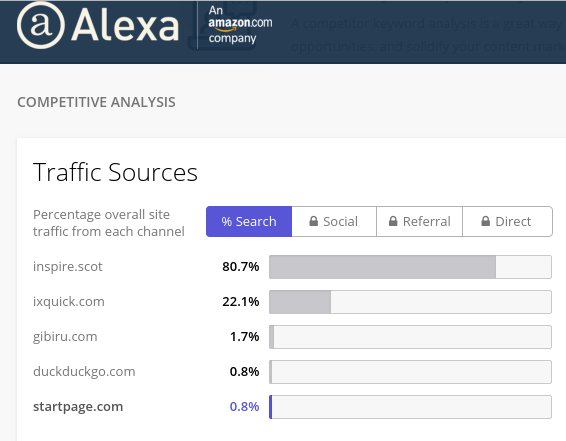
Summary: An ongoing attempt to better understand supposedly privacy-centric search engines and how they make money
FOLLOWING some recent investigations into privacy betrayals by so-called 'private' search engines that track clicks we've been getting useful feedback and pointers. I myself used to rely on a lot of Scroogle (until Google shut it down by deprecating APIs/access). Then I moved mostly to Ixquick, which later forced a redirection to Startpage. I stopped using that when they mysteriously added lots of JavaScript and awkward stuff which not only rendered the site inaccessible from my browser but raised all sorts of other concerns/questions. Prior to that I had already pointed out -- and confronted over -- several issues associated with Startpage's actions, both technical and operational. I explored alternatives and later used these permanently.
I spent about half a decade promoting Startpage (or Ixquick). Perhaps at the start they were well-meaning and they likely lacked a business model. Perhaps. If that new/later business model gravitated towards/around spying, then users deserve to know. They need to know. Startpage is not a charity or a public service.
We don't typically write about privacy and search engines (this isn't our focus, but
sometimes that relates to Microsoft entryism). We do, however, receive some valuable pointers and the more we cover it, the deeper we go. "Maybe you could help explain this," one reader said, referring to the observation (see above screenshot from
this page). "Startpage traffic channel source situation: http://inspire.scot 80.7%..."
The reader continued: "Why would over 80% of traffic to Startpage be channelled from http://inspire.scot, a web design and SEO/traffic company? Are there privacy implications in that?
"I understand why Ixquick would send over 20% -- maybe redirects since Ixquick sends users to Startpage now that they've merged into Startpage. DuckDuckGo has a Startpage "bang" !s or !sp that would send traffic to Startpage. That makes sense. Of course, the %'s add up to over 100%. Maybe it's very wrong, but I still don't understand why any 3rd party % would be significant. Thanks for any insights."
Our research skills may not be any better than this reader's, but the subject was nonetheless brought up in our IRC channels. They formally call themselves "Inspire IT Services" and the footer says "A Scottish Web Services Company" (very vague or too broad). Under "Search Engine Optimisation" (SEO) they have a section entitled "PPC (Pay per Click)" and it says in large fonts -- the headline -- "Are you getting an ROI from PPC? As a Google Premier Partner we can be trusted to get it right!"
So they're a "Google Premier Partner"; there's also an image there that says "Premier Google Partner" and above that it says: "Contact us today to find out more about our Google Premier Partnership and for more information about working with you on your Pay per Click Campaigns". Perhaps not unexpectedly, the site is bloated and every page there spies on the visitor on Google's behalf ("
google-analytics.com/ga.js").
Why would a close partner of Google drive this much traffic to a site that claims to compete against Google? That's a bit of an open question. The company is
based in Perth, not too far from the Scottish capital, and it has been around for over a decade (
incorporated in 2008). It lists
4 officers / 2 resignations, David and Maxine Dwyer as the principal ones (Director and Secretary, maybe spouses), plus a Martin Smith (very common name). He resigned 6 years ago. Their latest balance sheet can be found
here (not much in there in terms of money). But it's better than
past years. How can such a small shop -- perhaps a "mom and pop" store -- be commanding so much traffic (if the figures presented above are true)? That itself may be a mystery worth exploring further.
⬆

